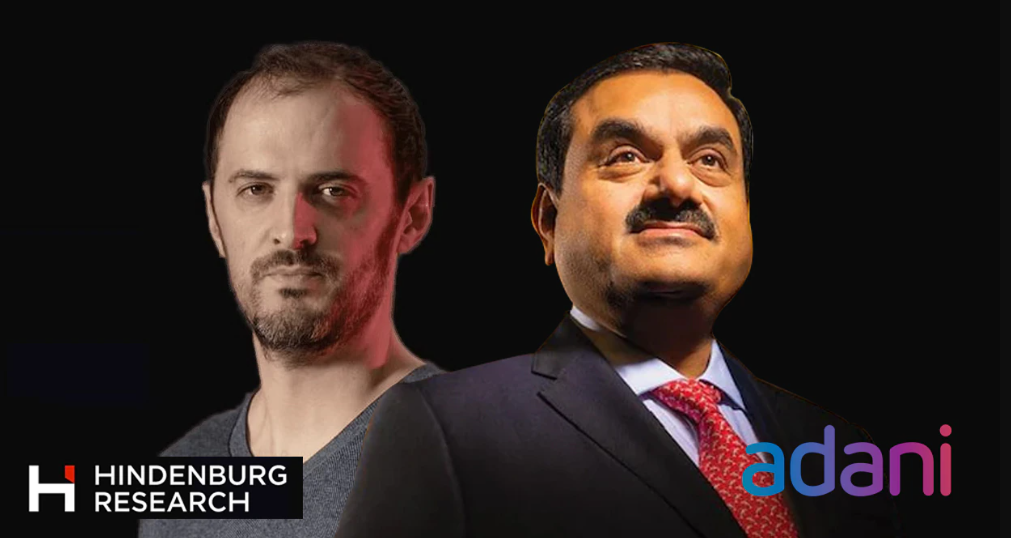In the intricate world of finance and corporate governance, the clash between Hindenburg Research and the Adani Group has captivated global attention. The latest development sees Hindenburg receiving a “show cause” notice from India’s Securities and Exchange Board (Sebi). This unfolding saga is a riveting tale of allegations, regulatory intrigue, and the battle for transparency.
The Spark of Controversy: Hindenburg’s Bold Accusations
In January 2023, Hindenburg Research, a US-based short-seller, published a scathing report on the Adani Group, alleging serious financial misconduct. This report accused the conglomerate of stock manipulation and the improper use of tax havens. The claims immediately sent shockwaves through the financial markets, affecting Adani’s stock prices and investor confidence.

Hindenburg’s allegations were not made lightly. Their report detailed a two-year investigation involving extensive research and data collection. The aim was to expose what they viewed as systemic fraud within one of India’s most powerful business empires. The detailed nature and the serious tone of the report left little room for ambiguity, painting a picture of a company embroiled in practices that could undermine market integrity. newsreporto.com
Sebi’s Response: Regulatory Scrutiny Under Question
Sebi’s reaction to Hindenburg’s report was swift but controversial. According to Hindenburg, Sebi began to covertly support Adani shortly after the report’s publication. They claim that the regulator pressured brokers to close short positions in Adani’s stocks, thereby creating a buying pressure to stabilize the stock prices. This intervention, Hindenburg suggests, was aimed at protecting Adani from the market turmoil triggered by the report.
Read Also: https://newsreporto.com/ratan-tatas-heartfelt-plea-save-a-puppy/
The situation became more complex when the Supreme Court of India intervened, instructing Sebi to investigate the allegations against Adani. Hindenburg noted that initially, Sebi seemed to align with some of the key findings from their report. However, the regulator later claimed it could not pursue the investigation further, raising questions about the thoroughness and impartiality of their scrutiny.
Inside the Regulatory Web: Meetings and Influences
One of the most critical aspects of this controversy is the alleged close relationship between Adani Group and Sebi. Hindenburg pointed out that Gautam Adani, the head of the conglomerate, met with Sebi Chairperson Madhabi Puri Buch twice in 2022. This revelation, combined with the perceived lack of rigorous investigation by Sebi, has led to speculations about the extent of influence exerted by Adani on the regulatory body.
Hindenburg’s insistence on transparency has driven them to file a Right to Information (RTI) application, seeking details on Sebi employees who worked on both the Adani matter and the Hindenburg report. They are particularly interested in uncovering the specifics of the meetings and communications between Sebi and Adani’s representatives, aiming to shed light on any potential conflicts of interest or undue influence.

The Show Cause Notice: An Attempt to Silence?
On June 27, 2023, Hindenburg received a “show cause” notice from Sebi, which outlined suspected violations of Indian regulations. The notice accused Hindenburg’s January 2023 report of containing misrepresentations intended to mislead readers. Hindenburg has publicly dismissed these claims, arguing that the notice is an attempt to intimidate and silence critics who expose corruption and fraud.
The publication of the 46-page notice by Hindenburg is a bold move, intended to keep the discourse public and transparent. They believe that Sebi’s actions are more about protecting powerful business entities rather than safeguarding investors from fraud. This perspective has further fueled the debate on the effectiveness and impartiality of India’s regulatory framework in dealing with corporate misconduct.
Financial Stakes and Moral Victory
Despite the intense scrutiny and legal challenges, Hindenburg stands by their report on Adani, describing it as the work they are most proud of. Financially, the short-seller claims that their gains from Adani shorts were relatively modest, especially when considering the extensive resources invested in their investigation. This underlines that their pursuit was not driven purely by financial gain but by a commitment to exposing what they perceived as significant market malpractices.
Hindenburg’s narrative suggests a broader message to Indian investors about the state of corporate governance in India. They argue that the system offers little real protection from fraud for investors and that influential businessmen can navigate or even manipulate regulatory frameworks to their advantage. This claim, if true, raises serious concerns about the integrity of financial markets and the trustworthiness of regulatory bodies.

The Broader Implications: Market Trust and Governance
The Hindenburg-Adani controversy is not just a corporate showdown but a reflection of deeper systemic issues within market regulation and corporate governance in India. The allegations and counter-allegations have sparked a debate on the role of regulators, the influence of powerful business entities, and the protection of investor interests.
For global investors and market watchers, this saga serves as a cautionary tale about the potential vulnerabilities in emerging markets. It highlights the need for robust and transparent regulatory mechanisms that can operate independently of corporate influences. Ensuring that markets are fair and transparent is crucial for maintaining investor confidence and fostering sustainable economic growth.
Awaiting Transparency: The Next Chapter
As the situation unfolds, all eyes are on Sebi’s response to Hindenburg’s RTI application and the subsequent actions from both sides. The demand for transparency and accountability is at the heart of this conflict, and the outcomes could set important precedents for regulatory practices and corporate governance in India.
Hindenburg’s determination to seek clarity and challenge the status quo underscores the critical role of independent research and oversight in maintaining market integrity. Whether their efforts will lead to substantive changes or simply stir temporary controversy remains to be seen. What is certain, however, is that the Hindenburg-Adani saga will continue to be a defining moment in the discourse on corporate accountability and regulatory efficacy in India.

